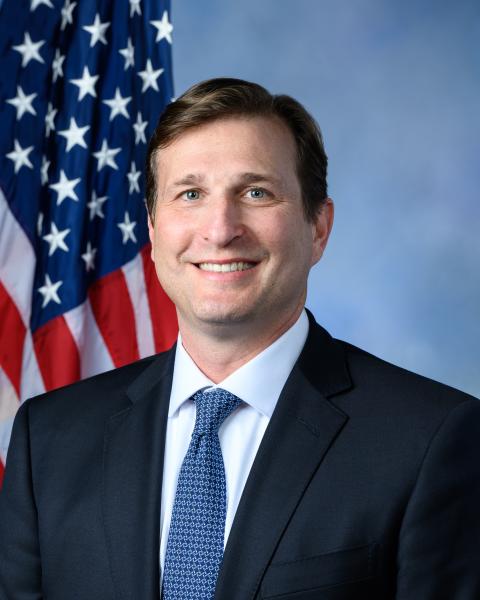In an interview, the New York Democrat urged more pressure on Ankara over Hamas, Cyprus, and destabilizing actions in the Eastern Mediterranean.
When Congress took up the annual defense bill last week, Turkey found itself at the center of attention, facing more than a dozen amendments that questioned Ankara’s conduct in the Eastern Mediterranean and beyond.
The proposed measures ranged from a temporary ban on arms sales to Ankara, to an examination of the risks posed by Turkey’s occupation of the northern part of Cyprus, to a review of its ties with Hamas and other groups designated as terrorist organizations.
In the end, the effort to fold the amendments into the defense bill did not advance for procedural reasons. Still, lawmakers sent a pointed political message: Turkey’s conduct must remain under scrutiny to safeguard key American allies in the Eastern Mediterranean.
At the center of the push was Representative Dan Goldman, Democrat of New York. A former federal prosecutor whose district includes Wall Street, Mr. Goldman is regarded as a rising figure in his party. He first gained national prominence for his role in high-profile investigations, including the first impeachment of Donald J. Trump.
In an interview with To Vima, Mr. Goldman voiced disappointment that neither President Biden nor former President Trump had applied effective pressure on Turkey over its relationship with Hamas. Looking ahead, he said, lawmakers would continue to advance the issues through stand-alone bills and by pressing the White House directly.
As he put it, referring to Turkey’s push to rejoin the U.S. program for fifth-generation fighter jets: “We cannot provide F-35s to a country that is supporting global terrorism. And that’s really what it comes down to.”
You advocated for amendments that will hold Turkey accountable for its affiliation with Hamas and other terrorist organizations, and also for stronger maritime partnership in Eastern Mediterranean. From now onward, do you have any alternative plans for holding Turkey accountable?
Well, I introduced a package of amendments that would put more restrictions and demands on Turkey to coordinate and collaborate with their NATO allies, to stop their support for Hamas, and to stop their occupation of the north of Cyprus. And this requires cooperation between the United States, Greece, Cyprus, in order to put more pressure on Turkey to adhere to democratic values.
You have spoken often about Turkey’s links to Hamas. Are you satisfied with the way the U.S, government, both the Trump and the previous Biden administration, have dealt with this issue?
No, I am not satisfied. I think we need to put a lot more pressure on Turkey. I understand that they are a NATO ally, that they are a critical ally in the region, on a number of different issues. But that does not mean that we can let them off the hook when they are openly supporting a terrorist organization, Hamas. They need to be held accountable; they need to be pressured more seriously about that because we cannot have an ally that is supporting terrorism against other democratic allies.
To what do you attribute this hesitation to take strong action against Turkey?
I think it’s because there is a lot of cooperation with Turkey on a number of different issues related to Russia, related to other international matters, and we would like for Turkey to continue to be an ally, but Mr. Erdogan continues to push in an opposite direction, having now jailed his potential opponent in an election. He is moving more and more towards an authoritarian, non-democratic state, and we have to oppose that, especially for a NATO ally. And so, some of the amendments in the NDAA and the bills that will continue pushing forward require more oversight by the United States of Turkey, and where our weapons are going and being used, what our support is being used for, and to put more restrictions on Turkey’s use of the military aid that we are providing them.
Can you share details about how you will continue pushing for that action forward?
Well, these amendments that we offered are also standalone bills. They are bipartisan. This is something that both Republicans and Democrats agree with. And we will continue to push not only for this legislation, but also for this administration to start to put more pressure on Turkey. Donald Trump has shown that he is willing to use his pulpit to go after our allies aggressively, and he should be doing that with Turkey, as well as other allies, when Turkey is also on one side fighting against democracy.
There is still in place the NDAA amendment that prohibits Turkey to acquire F-35 aircraft. How does Congress, both on the Republican and on the Democratic side of the aisle, view Turkey today?
Well, I think members in both parties are starting to catch on to Erdogan’s more aggressive authoritarian conduct. And we are in a bipartisan way pushing for there to be more restrictions on what our support is for Turkey until they stop supporting Hamas, they stop allowing money for Hamas to funnel through Turkey, and they stop allowing Iranian terrorist organizers to operate in their country. We cannot provide F-35s to a country that is supporting global terrorism. And that’s really what it comes down to.
We see a lot of initiatives and action in Congress, but do you believe that under Donald Trump the role of Congress in shaping U.S. foreign policy has weakened?
Absolutely. Donald Trump has tried to usurp all congressional power over foreign policy, whether that’s tariffs or international relations. And the Republicans in Congress, unfortunately, have not stood up for Congress’ authority and Congress’ power. And so, we will continue working on parallel tracks. One is congressional legislation. And the other is pressure on our administration to continue to ratchet up pressure on Turkey to defend Greece, to defend Cyprus, to defend democracy.
This year an amendment on Cyprus’s occupation was introduced for the first time. Why did you take that step? And has the U.S. done enough to push for a fair solution?
No, I think Cyprus is an example of where Turkey and Erdogan would like to go. And the fact that Turkey still occupies the northern part of Cyprus is problematic and is unacceptable. And so, I think it’s important to elevate the issue of Turkey’s occupation of northern Cyprus, which is Cyprus is an ally of the United States. It’s a democracy and we need to be out there protecting democracies all over the world from the growing anti-democratic forces that are growing in Turkey and China and Russia and Iran and North Korea. And they are now starting to join together and that’s very, very dangerous for our own national security as well as that of our partners in the Eastern Mediterranean.
Petros Kasfikis is an accredited correspondent covering the White House, State Department, and Capitol Hill for MEGA TV and newspaper To Vima. For the latest political developments from Washington, D.C., you can subscribe to his YouTube channel: youtube.com/c/PKas?sub_confirmation=1






